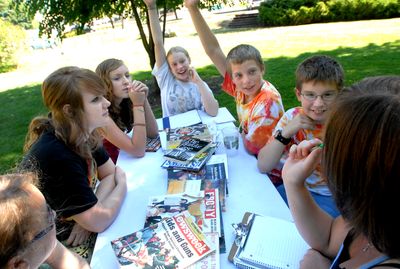Camp focuses on human rights
Program intends to make kids ‘agents of change’

Savannah Forno doesn’t look the part of a school shooter.
She doesn’t have the black trench coat. She gets good grades. Not to mention she’s a girl.
It’s anything but typecasting, and that’s exactly the point.
“We’re trying to stay away from stereotypical-type settings,” the Woodland Middle School eighth-grader said.
Forno is rehearsing a play that’s one of several projects in development by participants in the Young Advocates for Human Rights summer camp. They’ll present the projects to the public Aug. 23.
While Forno’s group of campers focused on school violence, others chose topics involving local and international human rights.
The program, held at Coeur d’Alene’s Human Rights Education Institute, aims to turn young teens into “agents of change in society.”
That’s why Sierra Pancoast’s parents signed her up.
“If I see someone at school and their human rights are being violated I can stand up for them,” Pancoast said.
During the camp, students heard a local perspective on human rights. Quanah Matheson, of the Coeur d’Alene Tribe, discussed white expansion from the viewpoint of a Native American. The time the students spent at the Coeur d’Alene Indian Reservation inspired an art project for a group of campers.
“It’s going to be a crane in a cage,” Woodland’s Kelsey Mein said. “It’s to symbolize how they’ve had their land taken away and they’ve been locked up in a way.”
Rachel Johns of the Coeur d’Alene Charter Academy said the crane was chosen because they “felt it was a really strong symbol for the Coeur d’Alene Indians. It’s a symbol of generosity.”
The weeklong camp – one of three this month – included a hike to the top of Mineral Ridge for a lesson in international human rights. Camp director Rachel Dolezal said the view was a way to help students think “beyond local boundaries.”
Even the hike up was a teaching opportunity. When students complained of being tired or thirsty, Dolezal told them about children in South Africa who have to pack water.
“You’re complaining because you’re tired, but what if you had to do this just to get clean drinking water?” she asked.
Rebekah Kastning said the camp was helping her accomplish a goal she’d set for summer vacation: to learn about world poverty and hunger.
As she researched Brazil, Kastning said, she realized the situation there was worse than she thought. She didn’t know hunger was so bad that children’s empty stomachs swelled.
“I feel really bad for them,” she said. “I want to somehow help them.”
That’s the idea behind a Web site she and fellow campers are creating to teach about child poverty and hunger in five countries. They hope the site will also provide a way to raise money toward the cause.